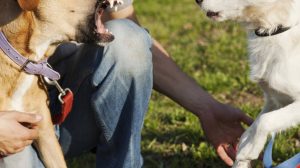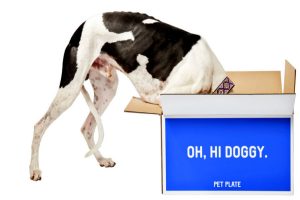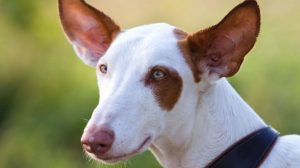If your fur nose shows no symptoms of an illness but still loses a lot of weight, then Giardia in dogs could be the cause. The small intestine parasites

They should be treated immediately because they multiply extremely quickly – and often remain undetected. Read more about the causes and symptoms of Giardia here.
Giardia is a unicellular small intestinal parasite that attaches itself to the intestinal wall. They attack not only dogs but also other mammals or reptiles, and birds. Giardia in dogs is not always noticed. Only puppies and dogs with a weakened immune system show noticeable Giardia symptoms when infested. Many animals appear perfectly healthy. However, Giardia is more common than dog owners realize.
Cause of Giardia in dogs
Giardia are flagellates. The parasites live in the dog’s digestive tract and feed on the contents of the animals’ intestines. However, they will eventually be excreted as cysts in the faeces of infected dogs. Giardia can survive in the excrement for up to a week. If they get into the ground or cold water, it can even be several weeks.
Your dog can become infected through the faeces of a sick animal, through contaminated water or food. Even frequent contact with a dog infected with Giardia is enough. When the animals lick or sniff each other, the parasites are transmitted.
Does my dog have Giardia? symptoms
Giardia can occur in healthy, strong dogs without you even noticing it. Many animals show no noticeable symptoms despite parasite infestation, making diagnosis difficult. In weaker and very young or old animals, recurring slightly liquid diarrhoea can indicate infection with Giardia. Notice if the stool is light yellow or slightly bloody in colour. Other symptoms include frequent bloating. Puppies may vomit. The consequences are weight loss and growth disorders; sometimes, skin inflammation occurs. Giardia can also cause symptoms such as diarrhoea and vomiting in humans. Possible signs of Giardia in dogs at a glance:
• weight loss
• Growth failure
• Discoloration of faeces (light yellow or slightly bloody colour)
• Bloating
• Vomiting (usually in puppies)
• Mild diarrhoea (usually in puppies or old animals)
• Skin inflammation (rare)
High risk of infection by Giardia
Caution: An infected dog is highly contagious, so that Giardia can spread very quickly in animal shelters or kennels with several animals. In particular, the droppings of very young dogs are contagious, as they usually contain very large amounts of parasites. Giardia can be transmitted from dogs to humans and vice versa. You can read more about this topic in the guide: “Zooanthroponosis: When dogs transmit diseases to humans”,









